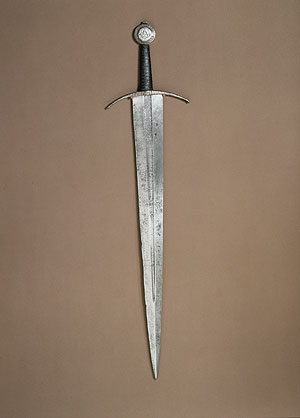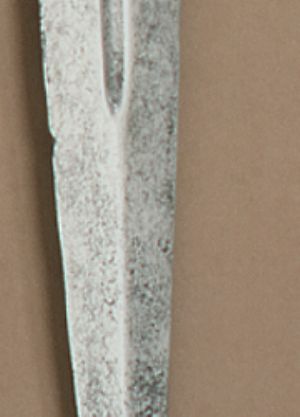Posts: 9,545 Location: Dayton, OH
Tue 30 Jan, 2007 6:14 am
Richard,
I'm well aware that Type XIV blades sometimes had diamond sections. I mentioned it in my post and in the Type XIV spotlight. :) And again, I also know that our modern typologies are an attempt to classify something that wasn't classified in its heyday.
However.... :)
With MRL, this is a recurrent problem. Even if the sword had a clear lenticular section, it still would have ended up with a diamond section. The way the diamond section is done on this one (if it's like others I've owned/seen) will still likely be incorrect since it will thicken the blade dramatically after the fuller runs out. The original was probably not like that. I don't remember any of the good Type XVI repros I've handled having that kind of thing either. I'd rather see them get it right on purpose than get some characteristics sort-of-maybe-right by accident. :) They seem to put the same basic blade sections and amounts of flex on every sword, regardless of what it should have. I guess I'm just tired of seeing Viking swords and Type XII's, etc. with diamond section points...
By the way, the Met Type XIV is the first sword shown in that spotlight article. It's been seen here a few times, I think. :) It also goes to show that sometimes more than just the blade shape goes into classifying a sword. These
Oakeshott blade types (X-XXII) are really one type of classification, part of a system. With Type XIV's, Oakeshott noted that these blades are
typically mounted with short grips, curved guards and wheel pommels. So while the blades on these two might not be exactly to our super-imposed modern specs, the rest of the sword leans it to Type XIV. The Solingen/Leeds swords whose blades fall between Type XII and XIV are similar cases. Looking solely at the blade, it's hard to know what to call it. Factor in the rest (wheel pommels, short grips, curved guards) and it becomes more clear. Some continue to call them type XII. Does it really matter whether it's a "Type XII with too much taper" or a "Type XIV with not enough taper?" :) If you know the typology, it shouldn't matter.
This is the heart of Ewart's typologies. Getting too fixated on one aspect doesn't help. Using the typologies to have a common frame of reference for discussing the entire sword is the goal. The typologies aren't meant for pigeon-holing a weapon. The point is to be able to describe its parts using a defined system so that the understanding of its parts will lead to a better understanding of the whole piece.
Regardless of the above, I do think it's nice that MRL is expanding things. I like the flare at the base of the blade. The pommel seems to have some shaping we don't normally see them do.



